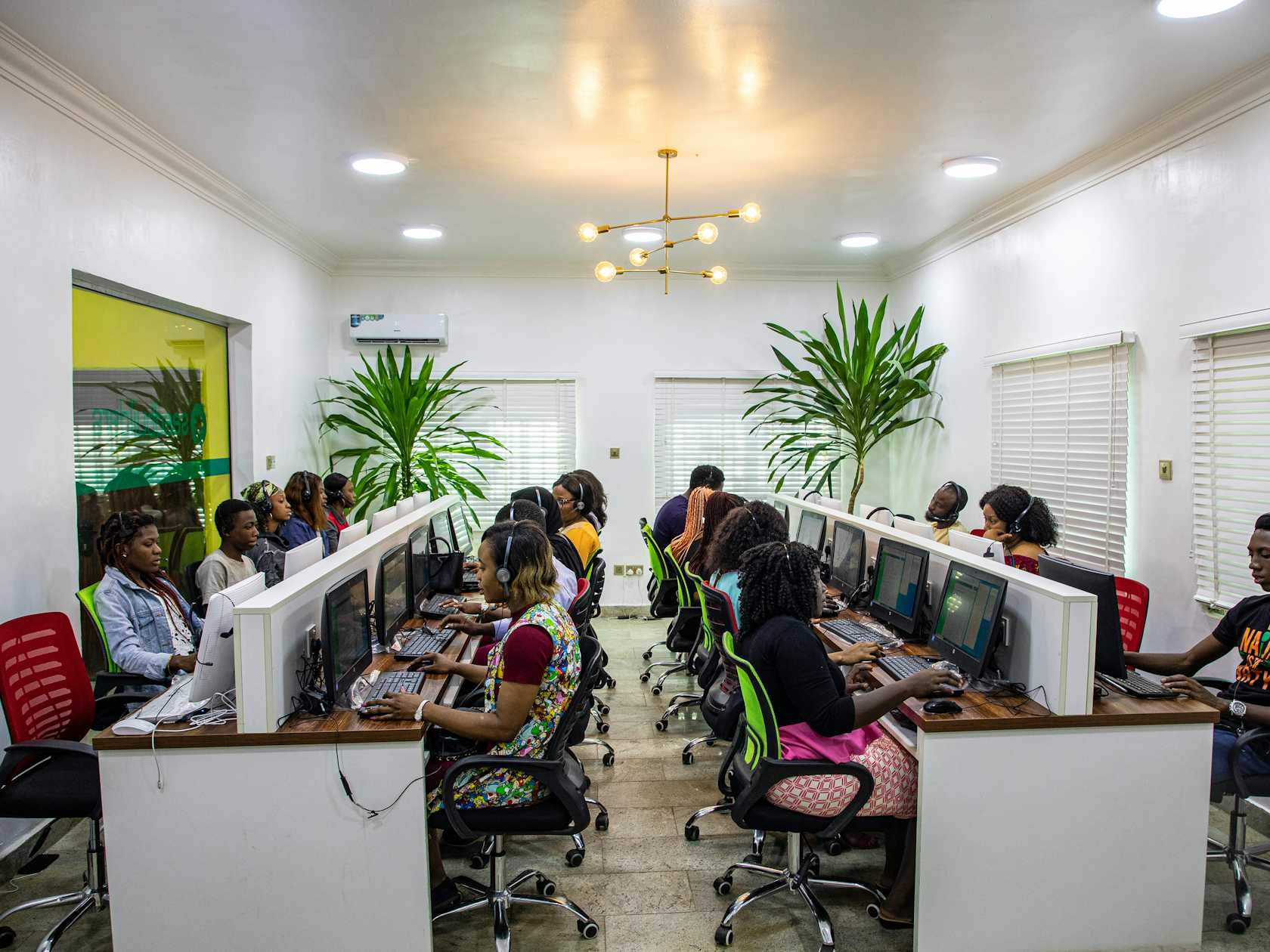Do Your Work and Go Home: The Toxic ‘Do Your Job’ Mentality in Corporate Nigeria.

It's an unwritten rule, but it's understood. Leave your problems at home. Leave your emotions outside the office door. Keep calm and carry on, in the most efficient manner possible. Above all, be silent.
This is the rhythm of Corporate Nigeria; a place where people are praised for their output but punished, quietly and consistently, for being human. Professionalism has been twisted into emotional detachment, and efficiency has become the mask worn to survive.
What looks like discipline from a distance is, up close, a slow form of depletion. Hiding behind the routine of signing in and meeting deadlines and pretending all is fine, an entire workforce is burning out in silence. The instruction to "Do your work and go home" is not freedom from pressure; it is an order to suppress your humanity so the system might keep moving.
Scarcity Became the System
To understand why this culture persists, you have to look at the economics that built it. In a country where jobs are scarce and unemployment remains high, fear has become the default workplace language. When everyone knows their job can be replaced by ten desperate applicants, silence becomes a survival instinct.
This is where the “just do your work” philosophy finds its roots. Employers understand their power, and employees understand their place. The relationship becomes strictly transactional: you give your time, they give their money. Nothing more.

You learn very quickly that your personal struggles are irrelevant. Stress, family issues, fatigue from three-hour commutes, the anxiety of living paycheck to paycheck, none of it counts. If you mention them, you risk being labeled "unserious," "emotional," or "unprofessional." The message is very clear: your humanity is a liability.
But this isn't just an office culture problem; it runs deeper. From a very young age, many Nigerians are taught to obey authority without question. The average child grows up in homes and schools where the expression of emotion or challenging of leadership is perceived as rebellion. And when those very children grow older and enter employment, the pattern follows them. They don't just fear losing their jobs; they fear displeasing authority.
The result is a culture of silence as safety, where obedience is misconstrued as loyalty. The very act of admitting you're struggling becomes an act of risk.
Unpaid Weight of Emotional Labor
Every day in Corporate Nigeria is a performance. People show up not just to work but to act out roles; poised, happy, competent, regardless of the drama occurring inside. The work of keeping that mask in place is invisible, but it is tiring.
This need for constantly seeming okay is known as emotional labor: unpaid work is done to manage your emotions so that others can be comfortable. It's never listed in any job description, yet it is one of the most challenging tasks employees face every day.
When the office forbids authenticity, the human body pays. Workers go home spent, not just from the work they did but also from the mask they had to wear at work. The toll shows up in subtle ways: headaches that never stop, irritability that bleeds into personal life, a sense of emptiness no promotion can fix.
A survey has shown that 69% of Nigerian workers have thought of quitting their jobs because of stress linked to toxic environments, while 35% have faced harassment or bullying. These are not just statistics; they are the quiet, measurable evidence of an emotional crisis.
Every morning, millions of people step into offices, pretending to be fine when they aren't. The company gets the illusion of stability; the employee loses another piece of themselves in exchange.
When Leadership Becomes a Tool of Control
It doesn't happen by accident. It is enforced, often by managers who believe that fear is the best way to get the most from workers.
Most of the business leaders in Nigeria are paternalistic, whereby they view themselves as guardians of discipline rather than facilitators. The workers or employees are regarded as children who need to be controlled rather than grown-ups who can be trusted.
It is a leadership structure that thrives on hierarchy, not collaboration. Micromanagement replaces mentorship. Obedience replaces initiative. Feedback is rarely encouraged unless it flatters the person in charge.
In such environments, vulnerability becomes lethal. To admit fatigue or mental strain is to invite perceptions of incompetence. To ask for flexibility is to be labeled entitled. And so, workers quickly learn to swallow their frustration and say “yes, sir” or “yes, ma” when their minds are screaming “no.”
When something goes wrong, the blame flows downwards. Employees take responsibility for problems they had no power to fix, while those at the top remain unaccountable. This cycle of intimidation ensures that silence remains the only safe option.
Over time, the workplace becomes a pressure cooker. Since open communication gets punished, resentment finds quieter exits: gossip, disengagement, or quiet rebellion. People begin to comply outwardly while withdrawing inwardly. The office becomes a stage, not a community.
The Hidden Collapse Behind the Calm
The effects of this chronic emotional suppression go way beyond the individual.
At the national scale, it's eating away at Nigeria's most valuable resource, its people. The relentless push for productivity with no empathy is creating a technologically competent but emotionally vacant workforce.

The brightest minds that are leaving. The global migration wave among young professionals is not a matter of salaries or infrastructure. Many are leaving because they want to breathe-to work in places where they can be respected, not just managed.
Those who stay often drift into survival mode. They show up, they do the bare minimum, they avoid trouble. This is presenteeism: being physically at work but mentally disconnected. It’s the silent sibling of burnout, harder to detect, but just as costly.
The effect is to be found in all sectors. Innovations slow down because employees are too afraid to take risks. Teamwork weakens because nobody wants to stick out, and the system rewards compliance, not creativity, so that output remains repetitive and uninspired.
Eventually, the economy pays the price: firms lose top talent to migration, spend fortunes on recruitment, and continue to replicate the selfsame cycle of overwork and emotional neglect. The country loses its thinkers and innovators, leaving behind a tired labor force running on fear and autopilot.
Human Cost of Professional Silence
For many employees, the most painful part isn't the workload; rather, it's the loneliness.
In offices where everybody is told to "just do their job," there is no room for empathy. People rarely inquire into the well-being of others, because caring has now become a distraction. Conversations get confined to task updates and smiles are mechanical. The warmth that once made work feel communal is gone.
The irony is that corporations promote teamwork yet design organizations that destroy it. How can you be a team player in a culture that teaches you to mask your emotions, distrust your colleagues, and fear your boss?
Where professionalism and emotional repression blur together, the workplace ceases to be human. It becomes an assembly line for exhaustion: rewarding endurance rather than fulfillment. The ones who finally burn out are quietly replaced, and the cycle continues.
When Strength Becomes Self-Destruction
The biggest risk to Corporate Nigeria is not bad infrastructure or unpredictable policy but in the gradual emotional break-down of its workforce.
The instruction to "Do your work and go home" has an innocuous tone but reveals a very perilous misunderstanding of what productivity really is. When businesses ask for efficiency with no empathy, they mistake silence for strength and endurance for excellence. But no system built on suppression will last.
The question is no longer whether this culture is sustainable-it isn't. The real question is this: Who will be left to keep the lights on when all the brightes
t, most capable people have left or burned out?
You may also like...
When Sacred Calendars Align: What a Rare Religious Overlap Can Teach Us

As Lent, Ramadan, and the Lunar calendar converge in February 2026, this short piece explores religious tolerance, commu...
Arsenal Under Fire: Arteta Defiantly Rejects 'Bottlers' Label Amid Title Race Nerves!

Mikel Arteta vehemently denies accusations of Arsenal being "bottlers" following a stumble against Wolves, which handed ...
Sensational Transfer Buzz: Casemiro Linked with Messi or Ronaldo Reunion Post-Man Utd Exit!

The latest transfer window sees major shifts as Manchester United's Casemiro draws interest from Inter Miami and Al Nass...
WBD Deal Heats Up: Netflix Co-CEO Fights for Takeover Amid DOJ Approval Claims!

Netflix co-CEO Ted Sarandos is vigorously advocating for the company's $83 billion acquisition of Warner Bros. Discovery...
KPop Demon Hunters' Stars and Songwriters Celebrate Lunar New Year Success!

Brooks Brothers and Gold House celebrated Lunar New Year with a celebrity-filled dinner in Beverly Hills, featuring rema...
Life-Saving Breakthrough: New US-Backed HIV Injection to Reach Thousands in Zimbabwe

The United States is backing a new twice-yearly HIV prevention injection, lenacapavir (LEN), for 271,000 people in Zimba...
OpenAI's Moral Crossroads: Nearly Tipped Off Police About School Shooter Threat Months Ago
ChatGPT-maker OpenAI disclosed it had identified Jesse Van Rootselaar's account for violent activities last year, prior ...
MTN Nigeria's Market Soars: Stock Hits Record High Post $6.2B Deal

MTN Nigeria's shares surged to a record high following MTN Group's $6.2 billion acquisition of IHS Towers. This strategi...
